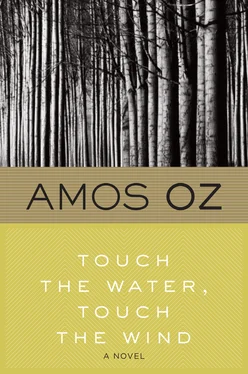This letter, owing to the circumstances, went astray and failed to reach the philosopher.
Conditions worsened considerably. Snow, torture, and suppressed rage besieged the town of M—.
The night wind hounded everything with its venomous fangs. Railway trucks left laden at night and next morning came back empty. Slowacski, Copernicus, and Pilsudski were torn from the street names. Even the chestnut trees were torn up to feed fires. Jews were taken from the town to learn productive labor to train them for their Palestine. Ukrainian peasants brought from far away toiled night and day in the workshops, machine-gun nests were set up on hills and rooftops, barbed-wire fences divided Jaroslaw Avenue, even the park benches were torn up and carted off to the foundry. Through the patchy fog thin tall tongues of flame could be seen rising from distant villages. The town grew ugly and flat.
Worst of all, the military governor, General Baron von Topf, found himself somewhat indisposed. On account of the damp climate, on account of the heavy burden of responsibility, on account of the weight of official obligations, on account of the narrowing of cultural horizons, a repulsive growth developed.
Frantic doctors came and went by day and by night. There was a consultation. A written opinion was even solicited from Professor Sauerbruch in Berlin. Meanwhile the offending growth thickened and spread: it sprouted from one of the lower vertebrae, it caused endless unpleasantness and embarrassment, and demanded humiliating subterfuges, it filled out the trousers, it hung obstinately down and could only with great difficulty be persuaded to conceal itself inside the knee-boot, it was warm and willful and brown, it was a frightening, indecent appendage, a hairy, outrageous postfix, which wriggled vigorously at the General Baron's command and for the most part even against his explicit orders, a mischievous extrusion, at one and the same time dependent and independent, flouting the rules of good taste and military discipline alike, and breaking free from the well-pressed trousers, a source of shame and anger.
In short, a tail.
So it was that the Baron von Topf gradually began to display less warmth toward the town's intelligentsia. He who had set up the historical circle and the orchestra and arranged theosophical debates. There were incidents which offended against good taste by any standards. For example:
A dinner party was arranged in the old castle, behind the grim stone walls raised to the glory of the kings of Poland. All the leading members of the intelligentsia were invited by the governor. Not one of them saw fit to decline the invitation and thus detract from their collective good manners. A special pass entitled the intelligentsia to be abroad that night during the hours of curfew. The French chef of the Huntsman's Inn was summoned to work miracles. The guests were conveyed in evening dress to the forbidden side of the bridge and at the entrance to Kazimierz Hall the sentries saluted. There were four identical vases on each table, and each vase held five symmetrically arranged chrysanthemums. The staff officers appeared, spotlessly turned out; the town orchestra was ready and waiting. The master of ceremonies entered, stood to attention and announced the adjutant, who entered, stood to attention and announced the military governor, General Baron von Topf, who limped hurriedly to the head of the table, sat down, and motioned the company to be at their ease. The governor had a sensational piece of news to announce: just before the dinner, literally at the last moment, it had been discovered that the president of the Goethe Society, the eminent philosopher Professor Zaicek, was residing in the town in circumstances of extreme obscurity, turning his back on his many admirers of both nationalities; and they were to be highly honored, the governor's own official car had already been sent to fetch the great man, and here he was. The Baron clicked his heels, bowed to the thinker and kissed his companion's hand, and exchanged pleasantries as he escorted them both to their places. Music.
It may be added that as an exotic touch a real Russian bear captured in the region of Smolensk had also been urgently summoned to be present. Among the topics discussed over dinner was the problem of causality, and the guests were not spared some surprising developments. In the course of the discussion, which was conducted in elaborate German, Professor Zaicek, along with the other guests, was served with hock and caviar, and the guest from Russia was served with the Professor. At once the bear was tried by court-martial, presided over by General Baron von Topf with a Polish defense counsel and a German staff officer prosecuting. The accused himself behaved in a thoroughly shaggy and silent manner throughout the trial, displaying a grim Russian stoicism and an almost morbid attitude in his every gesture. While the case was being heard he seemed drowsy, somewhat gloomy, heavy, and distinctly Slavic. With sharp knives he was stripped of his Bolshevik pelt and his meat was served up garnished with almonds and crumbled egg yolk. And the guests were given a free choice between red and white wine.
Later on the armed guards, and the adjutant's instructions, put out all the lights, and the party continued in darkness till daylight. The Polish intelligentsia, in their habitual way, were consumed with self-pity, tragic emotion, and theatrical grandeur. Indeed, outside, below the castle windows, several trucks were drawn up waiting for the guests to leave. Stefa, for her part, was ordered to play the piano. In obedience to a polite command she played till the night was done, Chopin, Schubert, fantasies and variations, agitation submission and rebellion, a marriage of souls in melancholy splendor between Poles and Germans, pork cooked in pork fat.
In sum, that night changed something in Stefa. A certain hardening. A certain closeness to the dreamy son of a watchmaker. If she only knew if and where.
Toward dawn a stranger entered and took Stefa by the arm. He bowed twice, assumed a well-modulated waiter's smile, politely escorted Stefa down into the underground levels of the ancient castle, through mossy cellars, twisting caverns deep below the walls, winding staircases, a rock-hewn labyrinth, among rust-eaten shields and bleached human bones, the stinking depths of Poland, onward, eastward, into the rising sun we march, a new dawn will break over the forests, the landscape will brighten again, golden wheatfields stretching into the distance, onward, always eastward.
The stranger was amazingly thin, deadly-looking, and extremely tall. He protected Stefa all along the way and saw her safely, and just in time, behind the Russian lines.
Large, laughing peasant women greeted her with their languorous songs, everywhere accompanied by the sweet sadness of the balalaika.
And the war ended.
Promised Land:
There to live in liberty, there to flourish, pure and free, there our hopes shall he fulfilled— thought through action may be stilled.
Death to the nightmares, look the light in the eye, make a new start in the blue brightness of summer. Settle. Down. In Sharon, rose of Sharon blooming, in the valley, lily of the valley, and on the mountains, the feet of the messenger. And the thin, mischievous mustache will come off once and for all. Start a new life. Reconciled, back to the land, youth regained, healing for body and soul, rest for the weary, balm for the wounded, let there be light.
In 1949, after several painful experiences, Pomeranz was finally forced to the realization that the only safe refuge for a Jew was in his own state in his own ancestral land, and so the wandering Jew arrived at last in Israel. He had some savings, in various Balkan currencies and in dollars, and he had also acquired on his travels a certain business sense. But he did not set his sights high. He wanted to live in the country, to work on the land, in peace. To find his own level. He determined to earn his living somehow, somewhere, while he prepared his body and his soul for working on the land, perhaps in a kibbutz. For the time being he was given a one-room apartment in Tiberias, overlooking the Sea of Galilee, in an Arab house whose occupants had fled.
Читать дальше

![Хироми Каваками - Strange Weather in Tokyo [= The Briefcase]](/books/29150/hiromi-kavakami-strange-weather-in-tokyo-the-br-thumb.webp)










